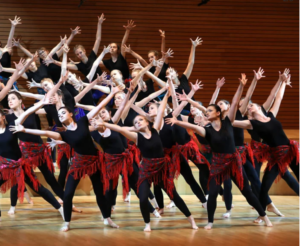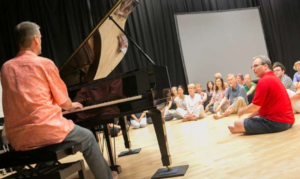
The ICDS Heads to Luxembourg
The International Conference of Dalcroze Studies (ICDS), in its 11 years of existence, has blossomed into an exciting new major event in the Dalcroze world. It attracts Dalcroze, Dalcroze-adjacent and Dalcroze-curious participants from around the globe, enabling practitioners to mix fruitfully with world-renowned performers, clinicians, and scholars in fields from music education to neuroscience.
Last year Americans hosted ICDS6 in our own backyard, at Dalcroze powerhouse Carnegie-Mellon University, and it did not disappoint. Keynotes included music legend Meredith Monk, who reflected on how Dalcroze informed her creative process from a young age, as well as eminent music education professors from Boston University and the University of Southern California. In the evening, we were treated to a unique collaboration between a capella group Roomful of Teeth and dance group Attack Theater. Our priceless Polish contingent spiced up our days with their fun and unique performance pieces, and, I don’t know about you, but I could watch Michael Joviala and Dawn Pratson improvise together all day long.
The conference concluded with two exciting announcements:
First, there was a transfer of leadership, from the conference’s original founder John Habron, who brought everything into being, to two new co-chairs – Stephen Neely and myself. We’re awed and excited to take this conference into the future, and we’ll do everything we can for its success.
Second, we’ll be holding ICDS7 at the University of Luxembourg, where it will be overseen by two tremendous co-chairs, Luc Nijs and Emma Shubin. Emma is of course an American Dalcroze institution, founding Integral Steps in Colorado, and now obtaining a PhD in Luxembourg with Luc. Luc is just the sort of brilliant and interesting scholar ICDS hopes to appeal to. A professor of early childhood music education, he publishes on topics combining music, psychology, education, and motion capture. The welcome page for ICDS7 can be found at www.dalcroze-studies.com .
Why attend the ICDS?
The ICDS summer conference occupies a uniquely enriching role for Dalcroze teachers. It complements more specialized Dalcroze summer courses by focusing on the many interfaces between Dalcroze, scholarship, and society.
We emphasize the interdisciplinary nature of our conference in next year’s theme, “Building bridges through music and movement: Inspire, Imagine, Transcend”. Submissions are asked to align along one of eight thematic tracks:
- Music and Movement through Technology
- Creativity in and through Music and Movement
- Music and Movement for Well-Being
- Music and Movement Across the Lifespan
- Movement in Instrumental Music Learning
- Diversity in Music and Movement
- Bridges
- Out of the Box
You can view a detailed description of each track at https://www.dalcroze-studies.com/thematic-tracks.
As usual, our keynotes will bring cutting edge thinking from prominent voices in the scholarly world. We will be announcing our keynotes shortly on our mailing list, but expect an exciting lineup encompassing the relationship between gesture and musical perception, the integration of music, movement and dramaturgy, and the medical benefits of Dalcroze work in seniors programs. `
After Covid, ICDS found ways to integrate virtual attendees into its experience, and there will be virtual attendees and presenters. As someone who chaired many of these sessions last conference, it is exciting to watch Dalcrozians log in from around the globe and present descriptions of their work, and the diverse populations they work with.

Many modalities for submission
In addition to the scholarship, the ICDS also offers a wide range of practical and applied offerings that will give you fresh ideas for your Dalcroze practice, or give you a chance to share your own experiences and ideas with the world. Within each of the thematic tracks, there are numerous formats for submission:
- Workshops (60 minutes including discussion)
- Paper / Workshop combination (90 minutes including discussion)
- Symposium (for 3-6 delegates, 90 minutes)
- Roundtable (90 minutes)
- Performance (variable timing)
- Paper (20 minutes with 10 discussion), including online presentations
- Poster
Many of our past workshops and rountables have been of, by, and for practical issues in Dalcroze education. Our papers and posters have not been limited to scholarly studies either – many contained elements of practice reflection. Some of these are by certified Dalcroze teachers, and many others are by adjacent practitioners in education, music, theater, and dance. The binding element is the revolutionary ideas of Emile Jacques-Dalcroze and the many ways these ideas have taken root in our society and changed the world. You can find the submission page at https://www.dalcroze-studies.com/call4submissions.

An International Gathering Like No Other
We’re very excited that the institution hatched by John Habron and his visionary team seems to have found a solid place in the world, with one foot in the Dalcroze ecosystem, and one foot in the broader world of scholarship. We think this is also a great place for you, as a Dalcroze practitioner, to enjoy learning about a wide range of work around the world integrating music, education, developmental science, embodiment, performance, and more, and to return home enriched.
You are also cordially invited to submit offerings, both individually and in groups (group presentations are particularly encouraged I’d say), to bring your own experiences and insights to the world. You are more than welcome to get in touch with Stephen and myself if you have any questions about submitting work to the conference, or if you would like any feedback on structuring your work for an acceptable submission.
The submission window is open right now, and stays open through the 15th of November, 2024. We hope to see you in Luxembourg next summer for the latest Dalcroze meeting of the minds!
Eric Barnhill received a Dalcroze Certificate from the Dalcroze School of New York; a License from Longy School of Music; a MM in Piano Performance from Juilliard; and a PhD in Medical Physics from the University of Edinburgh. He taught Dalcroze classes full-time for around a decade, directing the Music Skills program at the Music Conservatory of Westchester among others. He now works as a research engineer combining physiological signals and artificial intelligence. His work on predicting imminent cardiac events from ECG was recently published in Nature Digital Medicine. He is co-chair of the Scientific Committee of the International Conference of Dalcroze Studies.
Find a Dalcroze workshop near you or learn how to host your own event.